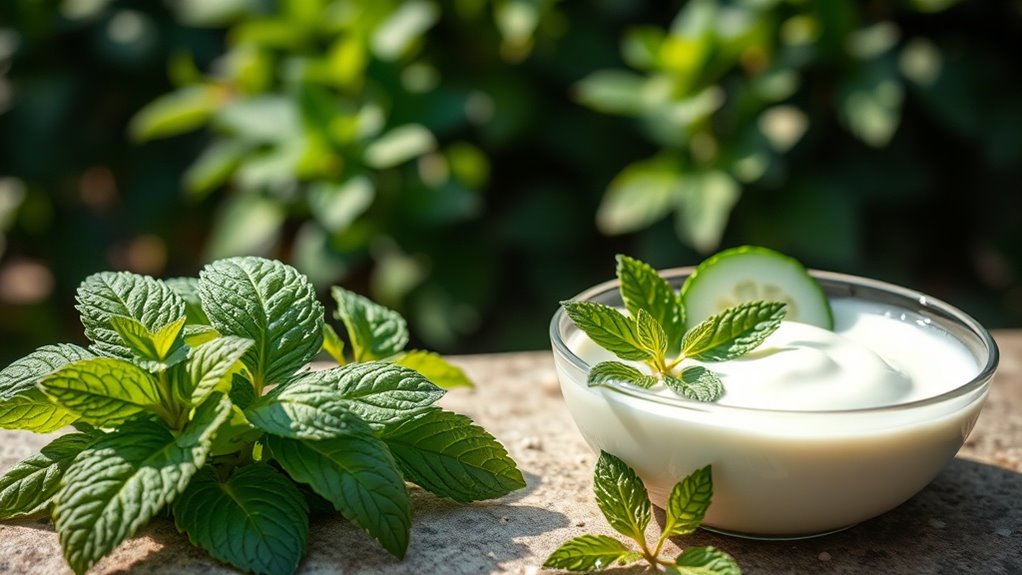Natural Ways to Keep Sweating Under Control
If you think excessive sweating is something you have to live with, think again. There are effective, natural methods to help you regain control. From herbal remedies to smart clothing choices, various strategies can minimize perspiration without harsh chemicals or medications. By understanding your body’s needs and making simple adjustments, you can significantly improve your comfort and confidence. What are the best ways to start this journey?
Understanding Excessive Sweating
While many people sweat during physical activities, excessive sweating—known as hyperhidrosis—can be a challenging condition that affects daily life. You might feel uncomfortable and self-conscious in social situations. Implementing sweating control hacks, like wearing breathable fabrics, using clinical-strength antiperspirants, or practicing relaxation techniques, can help manage symptoms and enhance your confidence. Understanding these strategies is essential for regaining comfort in your daily routine, as genetic factors and other underlying causes play a crucial role in excessive sweating.
Hydration and Its Impact
Staying hydrated is crucial for managing sweating, as proper water intake helps regulate your body temperature.
Incorporating hydrating foods like fruits and vegetables can boost your fluid levels and provide essential nutrients.
Plus, maintaining a balanced electrolyte level supports your body in managing sweat production more effectively. Drinking herbal infusions, such as mint or ginger water, can further enhance hydration and reduce sweating.
Importance of Water Intake
Hydration plays a crucial role in regulating your body temperature and, consequently, managing sweat production.
Staying properly hydrated can significantly reduce excessive sweating. Here’s how water intake can help:
-
Temperature Regulation: Adequate hydration helps your body maintain a stable temperature.
-
Electrolyte Balance: Water intake supports proper muscle function, preventing cramping.
-
Detoxification: Hydration aids your body’s ability to eliminate toxins efficiently.
Hydrating Foods Benefits
In addition to drinking enough water, incorporating hydrating foods into your diet can significantly enhance your overall hydration levels.
Foods like cucumbers, watermelon, and oranges not only contain high water content but also provide essential vitamins and minerals.
By eating these nutrient-rich options, you’ll help your body stay hydrated, maintain energy levels, and potentially reduce excessive sweating.
Your health will thank you!
Electrolyte Balance Influence
Although you mightn’t realize it, the balance of electrolytes in your body can significantly affect how much you sweat. Maintaining proper hydration plays a key role in regulating this balance.
Here are three essential electrolytes to consider:
- Sodium: Helps retain fluid and supports blood pressure.
- Potassium: Aids in muscle function and fluid balance.
- Magnesium: Reduces stress and supports overall hydration.
Herbal Remedies for Sweat Control
When seeking natural solutions for excessive sweating, herbal remedies can offer a refreshing alternative.
Consider sage, which has astringent properties that may help reduce perspiration. Witch hazel works similarly, tightening skin and minimizing sweat production.
Additionally, herbal teas like chamomile or lemon balm can calm your nervous system, potentially reducing stress-induced sweating. Incorporating these natural remedies for excessive sweating into your routine may enhance their effectiveness.
Test these remedies to see what works best for you!
Dietary Changes to Consider
What you eat and drink can significantly impact how much you sweat.
Staying well-hydrated helps to regulate your body temperature, while incorporating antioxidant-rich foods can combat oxidative stress and improve overall skin health. Additionally, making dietary changes such as reducing spicy foods and caffeine can play a key role in minimizing sweat production.
Hydration Effects on Sweat
Staying hydrated is crucial for regulating your body’s temperature and managing sweat production. Proper hydration helps maintain your body’s internal balance and can reduce excessive sweating.
Consider these dietary changes:
- Drink plenty of water throughout the day.
- Incorporate electrolyte-rich fluids, especially after exercise.
- Avoid excessive caffeine and alcohol, which can lead to dehydration.
Make these adjustments for better sweat management!
Antioxidant-Rich Foods Benefits
Antioxidant-rich foods can play a significant role in controlling sweating and enhancing your overall health.
These foods, like berries, green leafy vegetables, and nuts, help reduce oxidative stress in your body. By combating inflammation, they can stabilize your sweat glands and promote skin health.
Incorporating these tasty options into your diet not only helps manage perspiration but also boosts your immune system.
Clothing Choices to Minimize Sweating
Choosing the right clothing can significantly impact your comfort and confidence, especially when it comes to managing sweat.
Opt for breathable fabrics and loose fits. Here are three clothing choices to minimize sweating:
-
Cotton – It’s lightweight and absorbs moisture effectively.
-
Linen – This natural fabric allows air circulation.
-
Moisture-wicking synthetics – They draw sweat away from your skin, keeping you dry.
Lifestyle Modifications for Better Management
While it might be tempting to ignore lifestyle habits when managing sweat, small adjustments can lead to significant improvements.
Incorporate regular exercise to regulate body temperature and reduce stress; practice deep breathing to lower anxiety levels; and maintain a balanced diet rich in fruits, vegetables, and whole grains.
Staying hydrated can also minimize excessive sweating by helping your body cool itself effectively. Additionally, certain foods rich in magnesium, such as spinach and nuts, can further help in balancing bodily functions and reducing sweat production.
